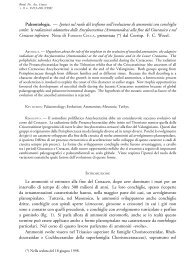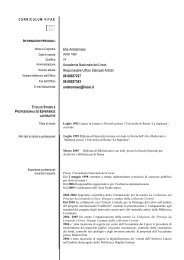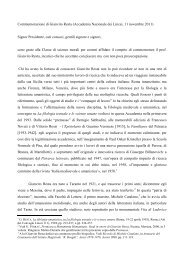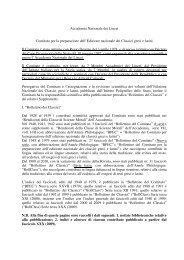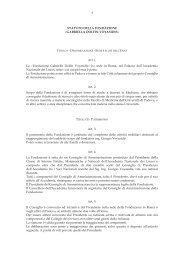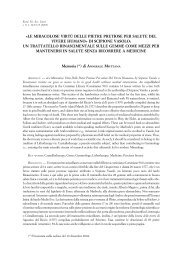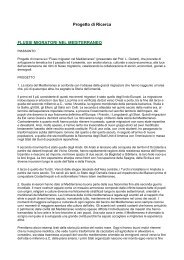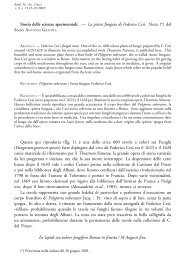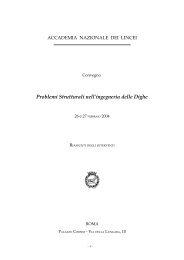plant genetic resources for food and agriculture - Accademia ...
plant genetic resources for food and agriculture - Accademia ...
plant genetic resources for food and agriculture - Accademia ...
You also want an ePaper? Increase the reach of your titles
YUMPU automatically turns print PDFs into web optimized ePapers that Google loves.
INTERNATIONAL WORKSHOP<br />
PLANT GENETIC RESOURCES FOR FOOD AND AGRICULTURE<br />
GENERAL ASPECTS AND RESEARCH OPPORTUNITIES<br />
ROME, 5 - 6 NOVEMBER 2009<br />
THE ORGANISING COMMITTEE: Sergio CARRÀ, Antonio GRANITI, Lamberto MAFFEI, Michele MORGANTE, Aless<strong>and</strong>ro<br />
PIGNATTI, Enrico PORCEDDU (Coordinator), Francesco SALAMINI, Gian Tommaso SCARASCIA MUGNOZZA<br />
8.00 Registration <strong>and</strong> Poster set-up<br />
PROGRAMME<br />
Thursday, 5 November<br />
9.00 Welcome addresses <strong>and</strong> introduction to the workshop<br />
10.00 Session 1 – Plant Genetic Resources <strong>for</strong> Food <strong>and</strong> Agriculture<br />
Chair: Gian Tommaso SCARASCIA MUGNOZZA<br />
Alvaro TOLEDO (FAO, Rome, Italy), Plant <strong>genetic</strong> <strong>resources</strong>: their strategic role in achieving global <strong>food</strong> security<br />
<strong>and</strong> sustainable <strong>agriculture</strong><br />
Shakeel BHATTI (ITPGRFA Secretary, FAO, Rome, Italy), The International Treaty on Plant Genetic Resources<br />
<strong>for</strong> Food <strong>and</strong> Agriculture (PGRFA): inter-dependence of countries<br />
11.00 Coffee break<br />
11.30 Emile FRISON (Bioversity International, Rome, Italy), The multiple contributions of agrobiodiversity to <strong>food</strong><br />
<strong>and</strong> nutrition security <strong>and</strong> to sustainable <strong>agriculture</strong><br />
Jozef TUROK (Bioversity International, Rome, Italy), The European Cooperative Programme on <strong>plant</strong> <strong>genetic</strong><br />
<strong>resources</strong><br />
Timothy HALL (DG Research, EU Commission, Brussels, Belgium), EU activities on agro-biodiversity<br />
research<br />
Discussion<br />
13.00 End of the morning session<br />
14.30 Session 2 – Opportunities <strong>for</strong> research<br />
Chair: Antonio GRANITI<br />
Wayne POWELL (University of Aberystwyth, United Kingdom), A new era <strong>for</strong> <strong>plant</strong> <strong>genetic</strong> <strong>resources</strong> based<br />
on emerging genome approaches<br />
Peter STAMP (ETH, Zürich, Switzerl<strong>and</strong>), Swiss maize l<strong>and</strong>races - a discovery <strong>and</strong> rediscovery<br />
Andreas KARAMANOS (Biomedical Research Foundation, Athens, <strong>and</strong> Faculty of Crop Science, Agricultural<br />
University of Athens, Greece), Drought resistance potentialities of Greek bread <strong>and</strong> durum wheat<br />
l<strong>and</strong>races<br />
16.00 Coffee break<br />
16.30 Andreas GRANER (IPK, Gatersleben, Germany), Utilization of <strong>plant</strong> <strong>genetic</strong> <strong>resources</strong>: opportunities <strong>and</strong><br />
constraints<br />
Beat KELLER (University of Zürich, Switzerl<strong>and</strong>), Unlocking <strong>genetic</strong> diversity from the gene pools of wheat<br />
<strong>and</strong> its relatives<br />
Paola BONFANTE (IPP-CNR, Turin, Italy), Plants <strong>and</strong> mycorrhizal fungi: an ancient ally <strong>for</strong> today’s <strong>agriculture</strong><br />
<strong>and</strong> <strong>food</strong><br />
./.
Friday, 6 November<br />
9.00 Session 2 – Opportunities <strong>for</strong> research (continuation)<br />
Chair: Aless<strong>and</strong>ro PIGNATTI<br />
Maarten KOORNNEEF (University of Wageningen, The Netherl<strong>and</strong>s), Arabidopsis natural variation as model<br />
<strong>for</strong> biodiversity research<br />
Michele MORGANTE (University of Udine, Italy), A genome based view of <strong>plant</strong> biodiversity<br />
Maud TENAILLON (INRA, Moulon, France), Tracking adaptive changes, application <strong>for</strong> the management of<br />
<strong>genetic</strong> <strong>resources</strong><br />
10.30 Coffee break<br />
11.00 Peter M. A. TIGERSTEDT (University of Helsinki - Tigerstedt Consulting Ltd, Finl<strong>and</strong>), Pre-breeding <strong>and</strong><br />
the epi-<strong>genetic</strong>s issue<br />
Rol<strong>and</strong> VON BOTHMER (Swedish University of Agricultural Sciences, Alnarp, Sweden), Diversity in cultivated<br />
<strong>and</strong> wild barley<br />
Francesco SALAMINI (Parco Tecnologico Padano, Lodi, Italy), Use of molecular <strong>genetic</strong> variability in <strong>plant</strong><br />
breeding<br />
Discussion<br />
13.00 End of the morning session<br />
14.30 Session 3 – Contents <strong>for</strong> the Meeting Report. Discussion<br />
Chair: Enrico PORCEDDU<br />
Toby HODGKIN (Bioversity International, Rome, Italy), Points <strong>for</strong> the Meeting Report<br />
Discussion<br />
17.30 Sergio CARRÀ (Politecnico di Milano, Lincei representative at EASAC), Conclusions<br />
* * * * *<br />
2010 has been declared the International Year of Biodiversity. In preparation <strong>for</strong> this event, the <strong>Accademia</strong><br />
Nazionale dei Lincei has proposed to the European Academies Science Advisory Council (EASAC) a study on Plant<br />
Genetic Resources <strong>for</strong> Food <strong>and</strong> Agriculture (PGRFA), the biodiversity section that ensures <strong>food</strong>, goods <strong>and</strong> services<br />
to human beings. The aim is to verify the general aspects introduced by the International Treaty on Plant Genetic<br />
Resources (IT-PGRFA) <strong>and</strong> the research opportunities these <strong>resources</strong> may offer.<br />
To gain first h<strong>and</strong> in<strong>for</strong>mation on the importance of PGRFA <strong>for</strong> European <strong>agriculture</strong>, the Academy has carried<br />
out a survey. The survey results indicate that the PGRFA are assessed almost unanimously as important / very<br />
important <strong>and</strong> are expected to remain so in the future, in view of the strong dependence of European <strong>agriculture</strong> on<br />
<strong>for</strong>eign <strong>genetic</strong> <strong>resources</strong>, the present narrow <strong>genetic</strong> base in most crops, <strong>and</strong> the need of genes <strong>for</strong> new traits, such as<br />
those <strong>for</strong> biological resistance to disease <strong>and</strong> tolerance to environmental stress, <strong>and</strong> adaptation to climatic change.<br />
Most European countries have a good system of conservation <strong>and</strong> a European Cooperative Programme is very<br />
active in coordinating conservation ef<strong>for</strong>ts. The almost two million samples preserved are mostly utilised as a source<br />
of genes but not <strong>for</strong> basic research. A wealth of knowledge can be obtained from their analyses, such as amount <strong>and</strong><br />
distribution of variation, identification of genes underlying that variation, natural selection <strong>for</strong> complex characters<br />
<strong>and</strong> adaptation, co-evolution of <strong>plant</strong>-other organisms. The in<strong>for</strong>mation gained would allow a better underst<strong>and</strong>ing<br />
on natural <strong>for</strong>ces that shape <strong>and</strong> maintain life on the Earth <strong>and</strong> provide scientists with indications useful to breed<br />
more sustainable varieties <strong>and</strong> to design a better management strategies <strong>for</strong> crop <strong>and</strong> natural st<strong>and</strong>s.<br />
The <strong>Accademia</strong> Nazionale dei Lincei has organised an international workshop, where delegates from various<br />
Academies <strong>and</strong> international organisations will present <strong>and</strong> debate these important issues. Poster exhibition will<br />
enrich the programme.<br />
In cooperation with<br />
ACCADEMIA NAZIONALE DELLE SCIENZE DETTA DEI XL, ISTITUTO DI GENETICA VEGETALE (IGV) - CNR,<br />
SOCIETÀ ITALIANA DI GENETICA AGRARIA (SIGA), BIOVERSITY INTERNATIONAL,<br />
ASSOCIAZIONE AMICI DELL'ACCADEMIA DEI LINCEI<br />
ACCADEMIA NAZIONALE DEI LINCEI - PALAZZO CORSINI, VIA DELLA LUNGARA 10<br />
Fino alle ore 10 è possibile l’accesso per le automobili da Lungotevere della Farnesina, 10




